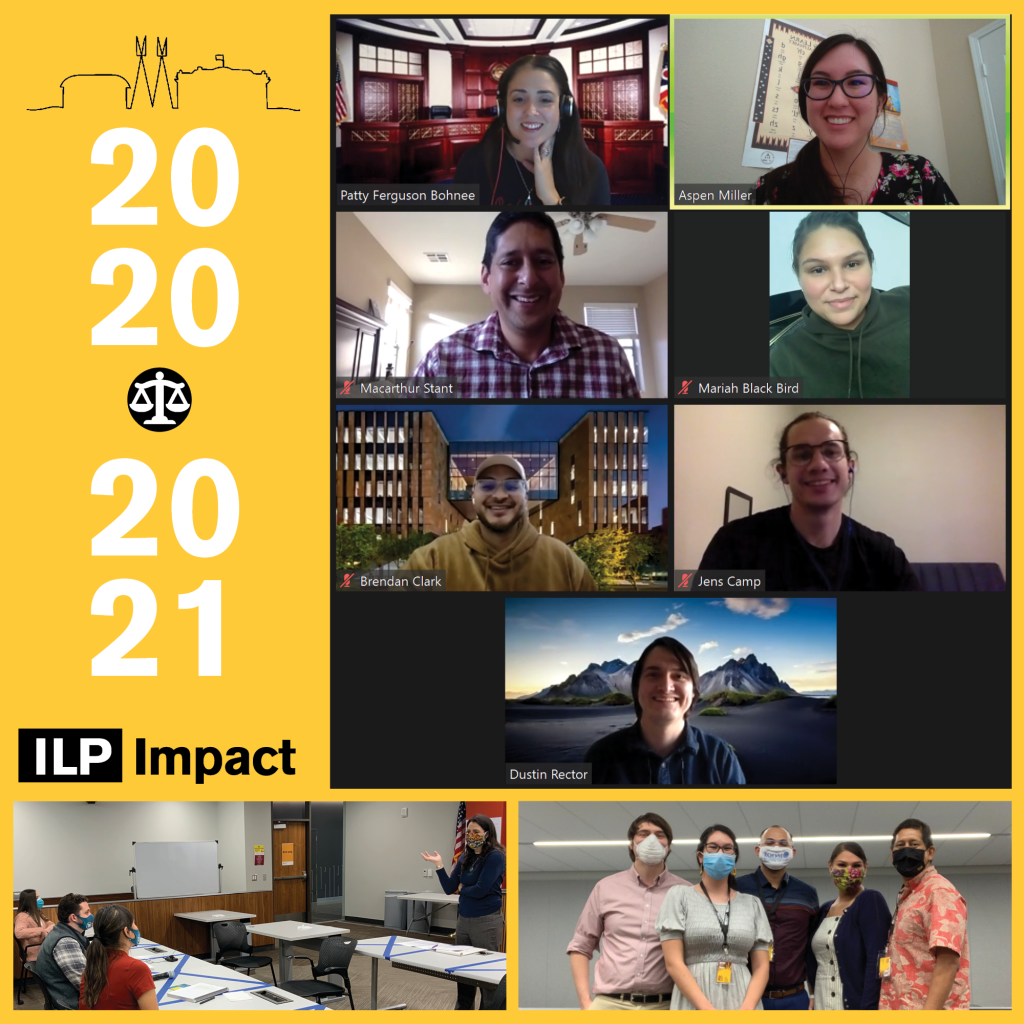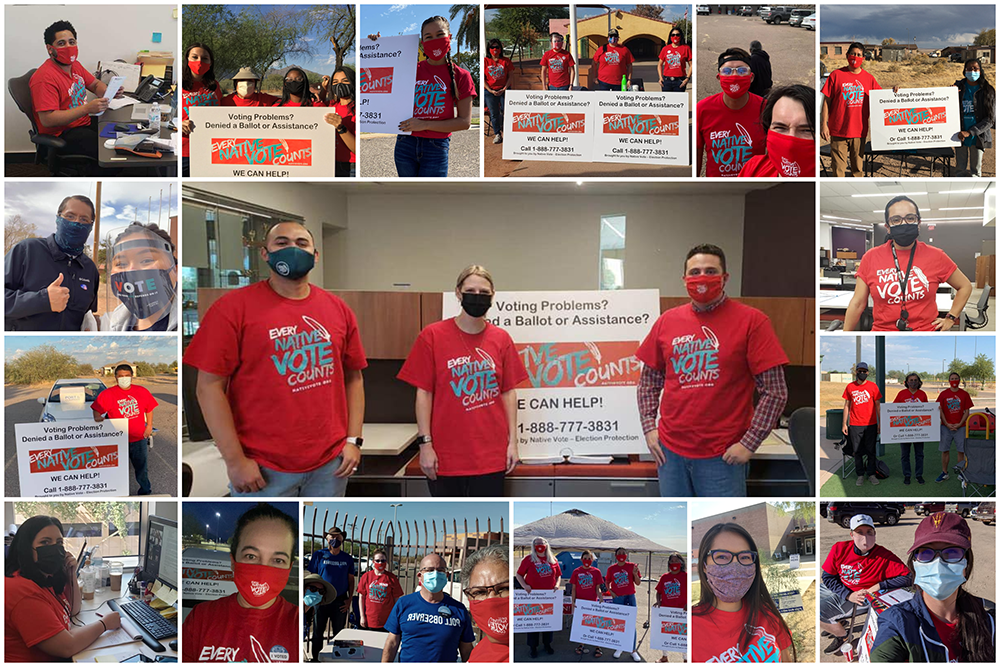The ILC was one of the only clinics at ASU offered to law students to work in-person, which adapted to work remotely with clients during the pandemic. If there is one thing thing to take away from this last year, it is that the ILC takes nothing for granted. Ten student attorneys, including two students that returned for a second semester, billed over 3,000 hours.
The ILC worked on 18 cases plus offered two wills clinics. Overall case subject matters included: civil, criminal, family, probate, civil rights, enrollment, land, and federal recognition. The ILC represented clients in tribal, state and federal courts, including filing a brief in the 9th U.S. Circuit Court of Appeals.
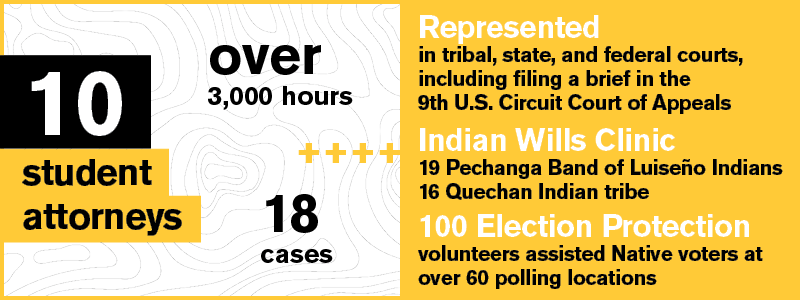
Student attorneys continued the Indian Wills Clinic partnerships with the Pechanga Band of Luiseño Indians and the Quechan Indian Tribe to draft estate planning documents under the direction of Professor Helen Burtis (’07). In October, 3L’s Mariah Black Bird, Jens Camp, Brendan Clark, Aspen M. Jensen, Dustin Rector and MacArthur Stant II executed 19 wills, financial powers of attorney, and health care powers of attorney for 14 members of the Pechanga Band of Luiseño Indians. In March, Brianna Minjarez (2L), Cierra Moore (2L), Vinnie Amato (2L) and Camp created 16 wills for members of the Quechan Indian Tribe.
“With online learning and not seeing as many people in person, it has been hard to stay cause-connected,” said Amato, one of the participating students. “Being able to help draft wills for tribal members over Zoom was a great experience because it refocused me on why I joined the Indian Legal Program. I also gained valuable skills I never would have received otherwise.”
“It was fun to get to know and offer guidance to the student attorneys, whose shoes I was in in the not-so-distant past,” said Simon Gertler (’18) attorney at Rosette, LLP who assisted as a supervising attorney. “It also served as continuing education for me in an area of law that I don’t normally practice. The best part was seeing the clients so appreciative of the students for helping them with their wills! I hope to continue being part of this special program.”
These wills clinics are designed to provide allotment owners with wills that conform to the provisions of American Indian Probate Reform Act.
2020 was a pivotal election year, especially for Arizona and Native voters! The Arizona Native Vote Election Protection Project (AZNVEP) worked tirelessly with partners—the Arizona Election Protection Coalition, the Inter Tribal Council of Arizona (ITCA), All Voting is Local, and the Native American Bar Association of Arizona (NABA-AZ)—to encourage and assist Native voters in the months leading up to the general election despite pandemic challenges. The ILC team included Native Vote Fellow Torey Dolan (’19), and 3L student attorney leads Clark and Rector, and 3L attorneys Camp, Jensen, Stant and Tarman under the supervision of Professor Patty Ferguson-Bohnee. Students even advocated for voting rights through litigation.
The ILC worked with outside counsel to prepare an affidavit that was filed on election day to extend polling place hours and require polling locations on the Navajo Nation that opened late to also remain open late.
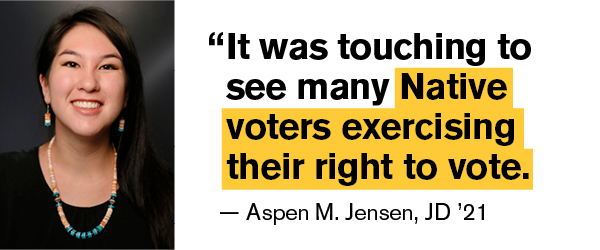
“Working in Chinle, Arizona with Native Vote during the 2020 election was my favorite memory in the ILC,” said Jensen. “It was touching to see many Native voters exercising their right to vote. I saw voters from before sunrise to after sunset. Some of my favorite memories of that day were seeing grandmas and grandpas wrapped up in blankets standing in line before the polls opened, helping a man who biked five miles and asked me to watch his bike while he voted, and helping a woman who stood firm after she was told the polls had closed but steadfastly held her rightful place in line until she eventually voted.”
On Election Day 2020, 100 Election Protection volunteers assisted voters at over 60 polling sites across Arizona and answered over 250 calls through the Native Vote Election Protection hotline. The ILC also worked with the Pascua Yaqui Tribe, the Campaign Legal Center, and Osborn Maledon to bring suit against the Pima County Recorder to restore early voting access.
Student attorneys researched and wrote “Decolonizing the Mindset,” a white paper on the inherent sovereignty of non-BIA listed Tribes. During their 2L year, Nathan Frischkorn and Tarman began drafting the paper in Spring 2020 and Tarman continued to work on it this year. Clark and Jensen prepared a brochure to accompany the white paper that can be used for educational purposes.
Last autumn, Jensen presented on “Decolonizing the Mindset” to the NCAI Federal Recognition Taskforce during the NCAI Annual Meeting. This spring, Tarman presented her paper to the Alliance of Colonial Era Tribes (ACET). ACET issued a certificate of appreciation to the Indian Legal Clinic for “Outstanding Service to the Cause of Justice for all Indigenous nations and working to decolonize the minds of Indigenous and non-indigenous Americans.”
Frischkorn (3L) and Jasmine Blackwater-Nygren (’20) with the guidance of April Olson (’06) assisted in drafting NABA-AZ’s comment in support of the Arizona Supreme Court amending its pro hac vice rules to allow nonmember attorneys representing Indian Tribes in Indian Child Welfare Act cases to appear without paying the pro hac vice fees or associating with local counsel. The amended Rule 39(a) went into effect January 1, 2021.
The ILC recently filed a brief in the Ninth Circuit Court of Appeals regarding the overreach of federal court jurisdiction in tribal affairs. Camp was the lead student attorney on the brief. During the semester, he and Amato assisted with pleadings filed with the District of Alaska in support of a motion to set aside a default judgment for lack of subject matter jurisdiction.
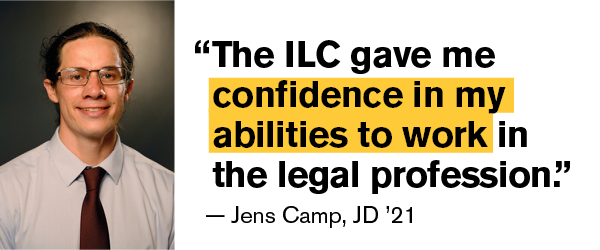
“The ILC gave me confidence in my abilities to work in the legal profession,” said Camp. “Thank you for being such an amazing teacher and mentor, Professor Ferguson-Bohnee! I will always appreciate how you treated the ILC student attorneys as colleagues and pushed us beyond our comfort zones. Clinic taught me more than any other course I took in law school, and I largely attribute this experience to your leadership.”
Returning student Camp received the International Academy of Trial Lawyers Award in recognition of his outstanding trial advocacy and clinical work. Earlier in the year, Camp helped draft a public comment for the National Congress of American Indians to proposed regulatory changes to the definition of habitat under the Endangered Species Act.
____
Honore Callingham (’18)
Law Fellow, Indian Legal Clinic, ASU Law
Torey Dolan (’19)
Native Vote Fellow, Indian Legal Clinic, ASU Law
Danielle Williams
Program Coordinator Sr, Indian Legal Program, ASU Law

